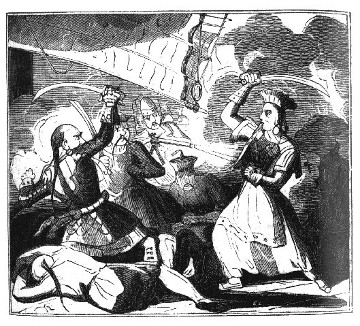
Mistress Ching, a character in the Pirates of the Caribbean franchise, was inspired by the historical figure of Ching Shih
THE STORY OF CHING SHIH — Zheng Shi in Mandarin — is a tale of love, betrayal, dodgy dealings with family and empire, plus a fair amount of prostitution — capped off with a lucrative retirement deal, and a legacy as one of the world’s bloodiest pirates.
Early life for Ching Shih was anything but glamorous. Her birth name was Shi Xiang Gu, and she worked as a prostitute in a floating brothel in Canton, which is modern-day Guangzhou, the capital of China’s Guangdong Province. Not a stellar beginning, but with a little luck, hard work, some financial acumen, and a knack for building alliances, Shi Xiang Gu would change her lot.
Luck came in the form of Cheng I, a kickass pirate wreaking havoc across the South China Sea, who asked (or perhaps demanded, or begged) for her hand in marriage. While Cheng I didn’t fancy the ladies — a fact some historical accounts tend to gloss over — he did see her as a capable partner, with an impressive head for management and finance, bolstered by the fact that she negotiated a 50% share of his plunder as condition to their marriage and for helping him build the Red Flag Fleet.
After their marriage, the pair soon adopted (kidnapped is probably a better description) a young boy named Cheung Po Tsai, who lived with them as a “son” of sorts. Well, not really, since he shared Cheng’s bed as his young male lover— and after the death of Cheng I a few years later, slept with Ching Shih as well (so much for family values). Cheung Po eventually became a formidable pirate in his own right, and later in his career — oddly enough — an officer in the Qing navy.
Tragedy and fortune struck all at once with the death of Cheng I. Tragedy because she’d lost her partner, and fortune because Shi Xiang Gu — now minted with the name Ching Shih (Cheng’s widow) — would soon gain control of 80,000 men or so, and around 1,800 ships (junks) of varying sizes.

The only known image of Ching Shih
As a pirate and former prostitute, Ching Shih wasn’t one to let conventional morality get in her way. One of her first tasks was to solidify her power by allying herself with Cheung Po Tsai, the rightful heir to the fleet. After neatly settling the issue of succession by making Cheung Po Tsai her second husband, she set about the business of building her pirate empire.
With her power consolidated, and a rigorous set of pirate codes set up to ensure discipline and order — including an absolute ban on rape (under penalty of death), although pirates could take captives as wives as long as they remained faithful — Ching Shih got to work. She took on the Qing Dynasty and the East India Company, as well as British and Portuguese ships along the way.
Finally, in 1810, an undefeated Ching Shih decided to retire — to the relief of her many enemies. She accepted a generous “retirement package” from the Qing government. After some clever negotiating on her part, she was allowed her to keep all of her ill-gotten pirate gains. Most of her crew was let off relatively easy as well.
With her loot in tow, she eventually opened a gambling den in Canton, where she lived until her death at the age of 69. Ching Shih, a former prostitute who rose to the rank of pirate captain, was so dangerous, in fact, the Chinese government effectively paid her off to retire, and then let her enjoy the fruit of her hard (if not honest) work into old age — a rosy fate most notorious pirates seldom get to claim.



-300x169.jpg)












